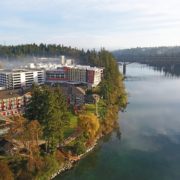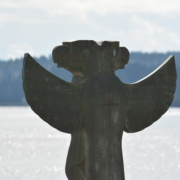S’Klallam Tribe and Suquamish Tribe Host Youth Vaccination Clinic on May 17 and May 26
All Tribal youth or any youth living in North Kitsap aged 12 to 17 now eligible to receive Pfizer COVID-19 vaccine
UPDATE: The vaccination clinic for youth will be repeated on May 26. Make an appointment at https://bookpgst.timetap.com.
The Port Gamble S’Klallam Tribe and the Suquamish Tribe are partnering to host a COVID-19 Youth Vaccination Clinic on Monday, May 17 from 8 a.m. to 4:30 p.m. at the Elders Center on the PGST government campus.
Tribal youth or any youth living in North Kitsap aged 12 – 17 are invited to get vaccinated at the clinic. An appointment is required and can be scheduled online at https://bookpgst.timetap.com. Vaccinations are provided free of charge.
There are 300 appointments available at this clinic. Participants will receive their first dose of the Pfizer COVID-19 vaccine. A second follow-up shot will be provided three weeks later. All participants will be expected to return to the same location for their second dose on June 7.
Parental consent is required for anyone under the age of 18. Parents or legal guardians can accompany their child to the appointment or provide a signed consent form along with a phone number should they need to be reached. Consent forms are available for download after setting up an appointment.
The Pfizer vaccine was recently approved by the FDA, CDC, and Washington State Health Department for youth as young as 12 years old.
The two Kitsap County tribes have worked hard to vaccinate adult members of their communities, as well as local teachers, school district staff, and other neighbors. Now, they are coordinating to ensure area youth can get vaccinated as quickly as possible.
“We’ve understood from the beginning that the best way to protect our Tribe from COVID-19 is to ensure as many people as possible get vaccinated, especially those in our Tribal community, their close contacts, and our staff, neighbors, and friends,” said Jolene Sullivan, PGST’s Health Director, who has been on the front lines coordinating the Tribe’s response to the pandemic. “Being able to administer vaccines to young people is an exciting next step in helping us move forward towards a pandemic-free life and we’re happy to be able to play a role in that.”
“This clinic is a major step towards safeguarding our families, schools, and the whole community,” said Cherrie May, Suquamish Tribe’s Emergency Operations Center manager. “We’re excited that youth throughout North Kitsap will be joining adults in getting vaccinated, and we’re looking forward to when we can fully reopen schools, gather for cultural activities, and travel in safety.”
While, generally, younger people haven’t experienced the worst symptoms of COVID-19, experts agree that vaccinating this group protects everyone. This includes limiting the potential for asymptomatic spread and variants that may be resistant to current vaccines. In addition, while teens and young adults are less likely to die from COVID-19, long-term symptoms can be serious and significantly impact quality of life.
During clinical trials, the COVID-19 vaccine from Pfizer was 100% effective at preventing infection among those aged 12 – 15.
Appointments for the May 17 Youth Vaccination Clinic are being accepted now at https://bookpgst.timetap.com. After check-in and vaccination, each participant will be asked to remain on site for 15 minutes for observation to ensure no adverse side effects. The Port Gamble S’Klallam government campus is located at 31912 Little Boston Rd. NE in Kingston.
This vaccination clinic follows an earlier series of vaccination clinics in which both tribes administered Moderna vaccinations to North Kitsap School District teachers and staff.
About THE PORT GAMBLE S’KLALLAM TRIBE
The Port Gamble S’Klallam Tribe, originally known as the Nux Sklai Yem or Strong People, are descendants of the Salish people who have been well-established in the Puget Sound basin and surrounding areas since 2400 B.C. In the late 1930s, the Port Gamble S’Klallam reservation, located on the northern tip of the Kitsap Peninsula in Washington State, was established. Many of the Tribe’s members, who total about twelve hundred, still live there today.
For more information about the S’Klallam Tribe, please visit www.pgst.nsn.us.
About SUQUAMISH TRIBE The Suquamish Tribe is a federally recognized sovereign tribe located on the Port Madison Indian Reservation along the Puget Sound west of Seattle, Washington. D’suq’wub, meaning “place of the clear saltwater”, has been home to the Suquamish people since time immemorial. It is the ancient place on Agate Passage, the site of Old-Man-House village, the winter home of Chief Seattle and the heart of the Suquamish People. It is here, past, present, and future, that the Suquamish People live on the land of their ancestors and of their great-grandchildren.



